The Hineni Project is comprised of a series of booklets containing sources and activities, whose objective is to bring parents and their bat/bar mitzva aged children closer together, with an emphasis on developing a Jewish humanistic identity, in an attempt to enable the next generation to shape themselves into additional links in the chain of our heritage.
In the framework of these intimate parent-child study sessions, we invite the participants to discuss the various components of identity that connect us to our personal, social and communal identity. The program seeks to highlight, through an approach of respect for each person – no matter who he/she is – a dialogue of social responsibility which draws its sources from Judaism on the one hand and “Israeliness” on the other.
This series is geared for the age of transition from childhood to adulthood and aims to welcome the child into the world of adulthood through an honest, mutual dialogue with his/her parents about values, aspirations and hopes. In this series, we seek to give children and parents the opportunity to experience a chavruta-type experience in which, even if the parent fills the role of guide or mentor, opportunities will be created in the course of study, for the family members to share ideas on an equal and mutually-inspirational basis, with no distinctions on the basis of age, gender, or status. This experience will constitute a gateway for the child to the world into which he/she is being invited to enter and participate.
Structure of the Program
The program consists of ten sessions. Each session focuses on a defined topic and together they create a conceptual sequence. Nevertheless, the program is modular, and each unit also stands alone. In that way, each parent/child pair can study the entire series in sequence, or alternatively, can select the topics they prefer to study in the order that they choose.
Schools and communities can organize bar/bat mitzva-year activities on the basis of the program, through inter-generational, family and communal study, which in the modular form, can climax with a day of experiential trips in the Jerusalem area and at the Hechal Shlomo Museum.
Each unit focuses on a social or identity-related topic beginning with biblical sources, continuing with rabbinic sources, and culminating with a variety of contemporary Israeli sources. In addition, each unit contains sources for enrichment related to a law from the Israeli legal system or a civic concept, with a quiz or game and a creative concluding activity.
The Project will also include:
- A website to accompany the project with expansion on the topics studied, online lectures, as well as ideas for related educational trips and projects. The website will be geared for parents, teachers, schools and communities who are implementing the program.
- Workshops for educational staff who are interested in an applied annual program within the school’s social education program relating to the bar/bat mitzvah year.
- Special experiential days in the Jerusalem area and in the Hechal Shlomo Museum for schools that implement the program for their bar/bat mitzva classes.
Unit Topics
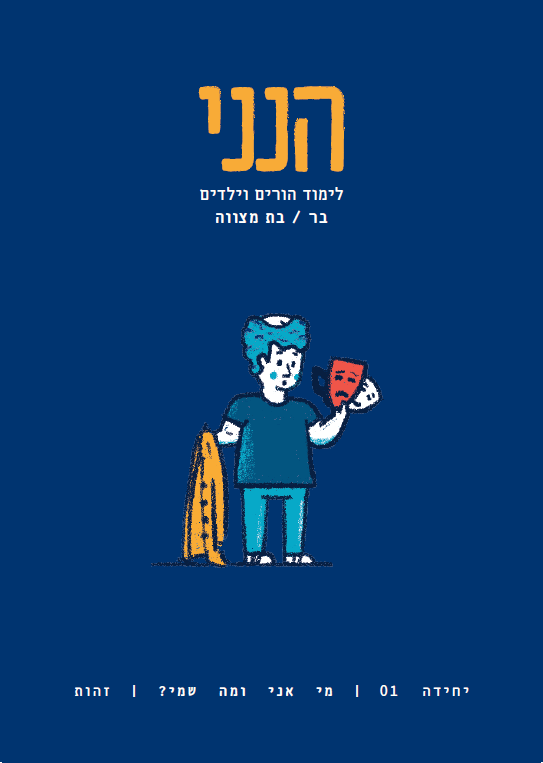 This unit focuses on understanding the components of identity that exist in each person.
This unit focuses on understanding the components of identity that exist in each person.
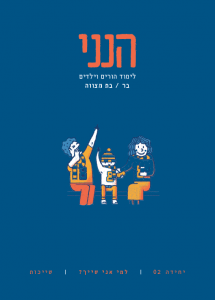 This unit focuses on the topic of affiliation of each child to family, community, country and nationality, and how each of these builds his/her identity.
This unit focuses on the topic of affiliation of each child to family, community, country and nationality, and how each of these builds his/her identity.
 This unit focuses on the topic of respect. Respect for every person is a basic Jewish value and is essential to the management of society and community. In this unit, we will discuss the honor which each person – oneself and other – is worthy of by virtue of the fact that he/she was created in the image of God.
This unit focuses on the topic of respect. Respect for every person is a basic Jewish value and is essential to the management of society and community. In this unit, we will discuss the honor which each person – oneself and other – is worthy of by virtue of the fact that he/she was created in the image of God.
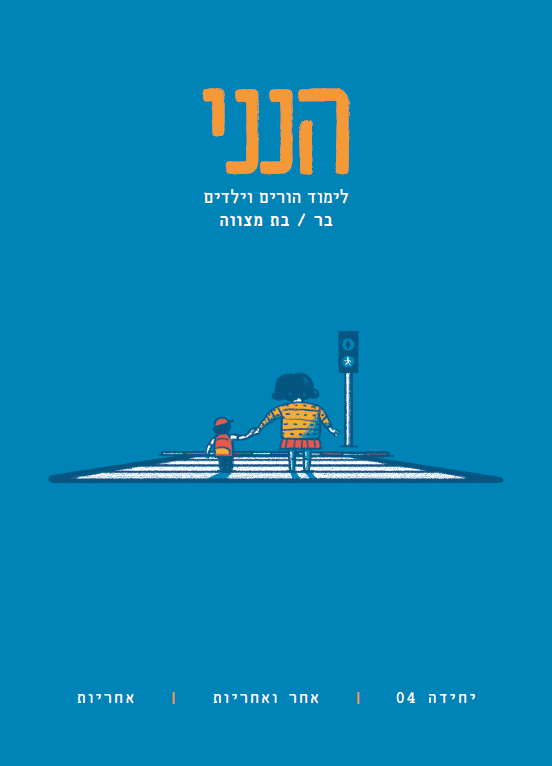 This unit deals with the topic of responsibility. Responsibility begins with the understanding that each person is responsible for him/herself and by extension, for his/her surroundings as well. We will deal with the question of what is the meaning of responsibility and for whom we are responsible.
This unit deals with the topic of responsibility. Responsibility begins with the understanding that each person is responsible for him/herself and by extension, for his/her surroundings as well. We will deal with the question of what is the meaning of responsibility and for whom we are responsible.
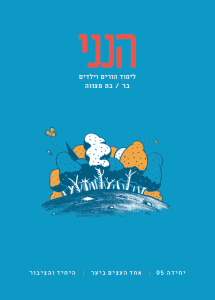 This unit deals with the topic of minyan as a concept which embodies partnership and responsibility, not exclusively from the perspective of religion and halacha. In Judaism, the community serves as an anchor in the life of a person. What is the partnership that is created between different people in the community? Can a person choose the group to which he/she is affiliated?
This unit deals with the topic of minyan as a concept which embodies partnership and responsibility, not exclusively from the perspective of religion and halacha. In Judaism, the community serves as an anchor in the life of a person. What is the partnership that is created between different people in the community? Can a person choose the group to which he/she is affiliated?
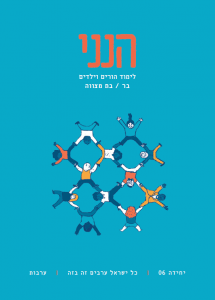 In this unit, we will explore the topic of mutual responsibility. The meaning of mutual responsibility is the understanding that we are all connected, and it entails the willingness to help another person, with each person utilizing his/her unique strength.
In this unit, we will explore the topic of mutual responsibility. The meaning of mutual responsibility is the understanding that we are all connected, and it entails the willingness to help another person, with each person utilizing his/her unique strength.
 This unit explores two topics – tzedaka – charity and tzedek – justice, from a social and economic perspective. Tzedaka is the responsibility of each individual in society to directly aid anyone requiring financial assistance. Tzedek is the responsibility to establish a political, governmental network for the benefit of each person with equal and equitable rights and economic security. In this unit, we will clarify these two concepts and attempt to consider their role in our lives.
This unit explores two topics – tzedaka – charity and tzedek – justice, from a social and economic perspective. Tzedaka is the responsibility of each individual in society to directly aid anyone requiring financial assistance. Tzedek is the responsibility to establish a political, governmental network for the benefit of each person with equal and equitable rights and economic security. In this unit, we will clarify these two concepts and attempt to consider their role in our lives.
 This unit deals with the topic of language. Language and speech are unique to people. In this unit, we will explore the power of words to facilitate growth and the power of words to cause damage. Therefore, we will explore the responsibility of each person toward the atmosphere engendered by their language.
This unit deals with the topic of language. Language and speech are unique to people. In this unit, we will explore the power of words to facilitate growth and the power of words to cause damage. Therefore, we will explore the responsibility of each person toward the atmosphere engendered by their language.
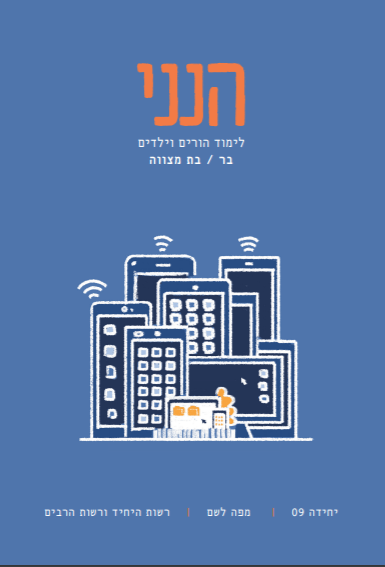
In this unit, we will explore the concepts of the private domain and the public domain as they are manifest in the modern world. In the wake of developments in technology and social media, the demarcation between these virtual domains has become blurred. In this unit, we will question whether the Internet is public domain and the actions dictated by this understanding.
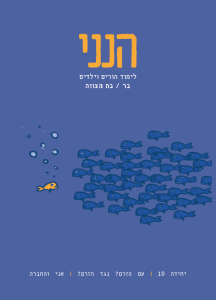 In this concluding unit, we will review everything that was learned until now and we will consider the place of the individual (me) relative to society. When is partnership important and when does social responsibility dictate specifically taking a stand against phenomena and trends that exist in society?
In this concluding unit, we will review everything that was learned until now and we will consider the place of the individual (me) relative to society. When is partnership important and when does social responsibility dictate specifically taking a stand against phenomena and trends that exist in society?
Target Population
The program is intended for a diverse population – religious, traditional and secular – and is fashioned for study in pairs or small groups.
- Parents and children who are interested in studying together.
- Schools seeking to incorporate the project into their bar/bat mitzva programs.
- Communities and educational groups who are seeking meaningful and value-based programs for the bar/bat mitzva year.
All of the above can find what they are looking for in the Hineni Project.
Have a question?
All Rights Reserved © | Terms of use | Site Map | Accessibility Arrangements